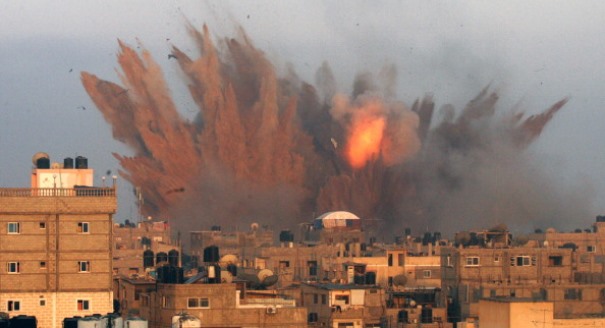Judy Dempsey
{
"authors": [
"Judy Dempsey"
],
"type": "commentary",
"blog": "Strategic Europe",
"centerAffiliationAll": "",
"centers": [
"Carnegie Endowment for International Peace",
"Carnegie Europe"
],
"collections": [
"Europe’s Southern Neighborhood"
],
"englishNewsletterAll": "",
"nonEnglishNewsletterAll": "",
"primaryCenter": "Carnegie Europe",
"programAffiliation": "",
"programs": [],
"projects": [],
"regions": [
"Middle East",
"Israel",
"Palestine"
],
"topics": [
"Foreign Policy",
"Security",
"Military",
"EU"
]
}
Source: Getty
Judy Asks: Has Europe Walked Away From the Israeli-Palestinian Conflict?
Every week, a selection of leading experts answer a new question from Judy Dempsey on the foreign and security policy challenges shaping Europe’s role in the world.
Every week, a selection of leading experts answer a new question from Judy Dempsey on the foreign and security policy challenges shaping Europe’s role in the world.
Muriel AsseburgSenior fellow at the Research Division for the Middle East and Africa of the German Institute for International and Security Affairs (SWP)
The EU and its member states have not played any significant role in efforts to mediate in the latest escalation in Gaza. Instead, they have seemed content to delegate all responsibility for crisis management to the United States and to regional parties, above all Egypt.
After the beginning of the latest violent dispute, Europeans positioned themselves clearly on Israel’s side, stressing its “legitimate right to defend itself” against Hamas rockets, rather than taking a more nuanced stance or prioritizing an end to the violence.
Only after mounting casualties did Europeans start to demand a ceasefire, but without assuming an active role in addressing the underlying reasons of the current escalation. This is surprising given that the EU could contribute to a regular and internationally guaranteed traffic of people and goods through Gaza’s crossings by revamping its EU BAM Rafah border mission and thus help end the blockade on the coastal enclave.
Europeans have continued to support Palestinian institution building, backed the latest round of U.S.-mediated peace negotiations, and adopted guidelines barring Israeli companies and institutions in territories occupied in 1967 from EU funding. But since the start of 2014, the EU has had no special representative to the Middle East peace process.
Europeans have thus deprived themselves of a potentially important channel to the parties on the ground, through which they could contribute to crisis prevention. That only adds to their ill-advised no-contact policy toward Hamas, which has robbed them of a conduit to one of the main parties in the conflict.
Lina KhatibDirector of the Carnegie Middle East Center
Whether because of fatigue with a decades-long process that is not yielding results, a change in foreign policy direction, or a lack of capacity, it appears that Europe has given up on the Palestinian-Israeli peace process.
European countries have been vocal against the latest confrontation between Israel and Hamas, but the calls for calm have been limited in scope. German, Italian, French, British, and EU representatives have been discussing ways to support the United States in its plea for a ceasefire. But none of them has gone as far as using the current crisis as a framework to push for a meaningful resurrection of the Palestinian-Israeli peace process or to put forward an innovative way for Europe to play a role in it.
Of course, the fighting between Israel and Hamas is a direct result of the lack of progress on the peace process. Despite the gravity of the ongoing violence, Europe’s position has not addressed this bigger picture.
This does not bode well for Israelis or Palestinians, who need all the international engagement they can get to reach a deal that’s acceptable to both sides. But a diminished role for Europe in the peace process is also part of a wider European trend toward decreased engagement in international politics. A muted Europe reveals more about its own political future than about anything else.
Daniel LevyDirector of the Middle East and North Africa Program at the European Council on Foreign Relations
Europe has not walked away, it has simply continued to play a rather marginal and unconstructive role.
That role is defined by a combination of internal division, excessive deference to U.S. positions, and, for some, a deliberate distortion of the conflict’s realities driven by political cowardice. The EU foreign ministers’ statement of July 22 was a Christmas tree affair, decorated with an eclectic mix of good, bad, and irrelevant policy positions. But by adopting Israel’s position on disarming Hamas and more, the EU sent a signal that was spun by Israel as an invitation to ramp up its military operation at an appalling cost in Palestinian civilian casualties and suffering.
Some Europeans once again assumed that Israel would be more reasonable if indulged. That never works. Only if Europeans decide to prioritize conflict resolution over their bilateral relations with Israel will their actions be effective. That shows little sign of happening.
Likewise, Europeans have no meaningful strategy toward the Palestinians. Europe passively supports but does not actively engage with Palestinian reconciliation. Europeans boycott Hamas while paying the bills for Israel’s repeated destruction of Palestinian infrastructure and economic life.
Contemporary European policy is not responsible for this ongoing, escalating conflict. For that, blame Israel’s determination to perpetually dispossess the Palestinians, and Palestinian failure to produce a more effective strategy than either the indiscriminate violence of Hamas or the supine pleading of Fatah.
Indeed, until there is a Palestinian leadership able to translate European public sympathy into meaningful political asks and costs, then expect a meandering and marginalized European policy to continue.
John ReedJerusalem bureau chief at the Financial Times
Not at all. Taken together, European countries are Israel’s largest trading partners and the biggest donor to the Palestinian Authority. While the United States is the only country with serious influence over both parties to the conflict, and will remain so for the foreseeable future, the EU and its member states have recently shown themselves willing to wield their financial leverage over both sides.
Europe’s emerging set of guidelines discouraging trade with and investment in settlements in East Jerusalem and the West Bank are reinforcing the Green Line, the only internationally recognized border between Israel and a future Palestinian state until the two sides make peace. These guidelines have infuriated rightist Israeli politicians, who say they only harden Palestinian negotiating positions. But it would be hard to argue that the guidelines are not influencing the Palestinian stance or the public debate in Israel in any way.
On the Palestinian side, the EU and its member states, together with their funding institutions, are thick on the ground in the occupied territories. With varying degrees of success or failure, every day they lean on politicians and decisionmakers to pursue broad economic development and peacemaking principles, on which the Europeans tend to agree with the Americans.
Sylke TempelEditor in chief of Internationale Politik at the German Council on Foreign Relations
Europe might have lost hope that the Israeli-Palestinian conflict can be solved—but they didn’t have to walk far to turn away. After all, Europe has never played a decisive role in solving the conflict.
Yes, the EU has supported the Palestinian Authority. But it has not been a leading power in coming up with new initiatives, creative thinking, or the kind of necessary shuttling back and forth between Israelis and Palestinians that the United States has exercised repeatedly.
The Europeans could play a more important role, if only they would recognize a few basic facts.
This conflict is largely, but not solely, about settlements. Europe should be ready to punish Israeli governments if they keep building, especially outside areas that are designated for a land swap. But Europeans should also recognize that no Israeli government will withdraw from Palestinian territory without sustainable security arrangements.
If Europe wants to contribute to a lasting negotiated peace, it needs more creative thinking. Gaza could be a starting point, if Europe can help find a way to keep Hamas from rearming while providing ordinary Palestinians with a better economic perspective. Neither side of this equation will work without the other.
Most peace initiatives over the years failed because the Palestinians insisted on a right of return not into a state of Palestine but into Israel. If Israelis must be told that settlements are not acceptable, then it’s high time to tell the Palestinians that they should return to a Palestinian state.
If Europe is ready to talk and act tough, then it should play a more important role. If not, the Europeans should walk away even further.
About the Author

Nonresident Senior Fellow, Carnegie Europe
Dempsey is a nonresident senior fellow at Carnegie Europe
- Europe Needs to Hear What America is SayingCommentary
- Babiš’s Victory in Czechia Is Not a Turning Point for European PopulistsCommentary
Judy Dempsey
Recent Work
Carnegie does not take institutional positions on public policy issues; the views represented herein are those of the author(s) and do not necessarily reflect the views of Carnegie, its staff, or its trustees.
More Work from Strategic Europe
- Europe on Iran: Gone with the WindCommentary
Europe’s reaction to the war in Iran has been disunited and meek, a far cry from its previously leading role in diplomacy with Tehran. To avoid being condemned to the sidelines while escalation continues, Brussels needs to stand up for international law.
Pierre Vimont
- Taking the Pulse: Can European Defense Survive the Death of FCAS?Commentary
France and Germany’s failure to agree on the Future Combat Air System (FCAS) raises questions about European defense. Amid industrial rivalries and competing strategic cultures, what does the future of European military industrial projects look like?
Rym Momtaz, ed.
- Macron Makes France a Great Middle PowerCommentary
France has stopped clinging to notions of being a great power and is embracing the middle power moment. But Emmanuel Macron has his work cut out if he is to secure his country’s global standing before his term in office ends.
Rym Momtaz
- How Europe Can Survive the AI Labor TransitionCommentary
Integrating AI into the workplace will increase job insecurity, fundamentally reshaping labor markets. To anticipate and manage this transition, the EU must build public trust, provide training infrastructures, and establish social protections.
Amanda Coakley
- Can Europe Still Matter in Syria?Commentary
Europe’s interests in Syria extend beyond migration management, yet the EU trails behind other players in the country’s post-Assad reconstruction. To boost its influence in Damascus, the union must upgrade its commitment to ensuring regional stability.
Bianka Speidl, Hanga Horváth-Sántha










